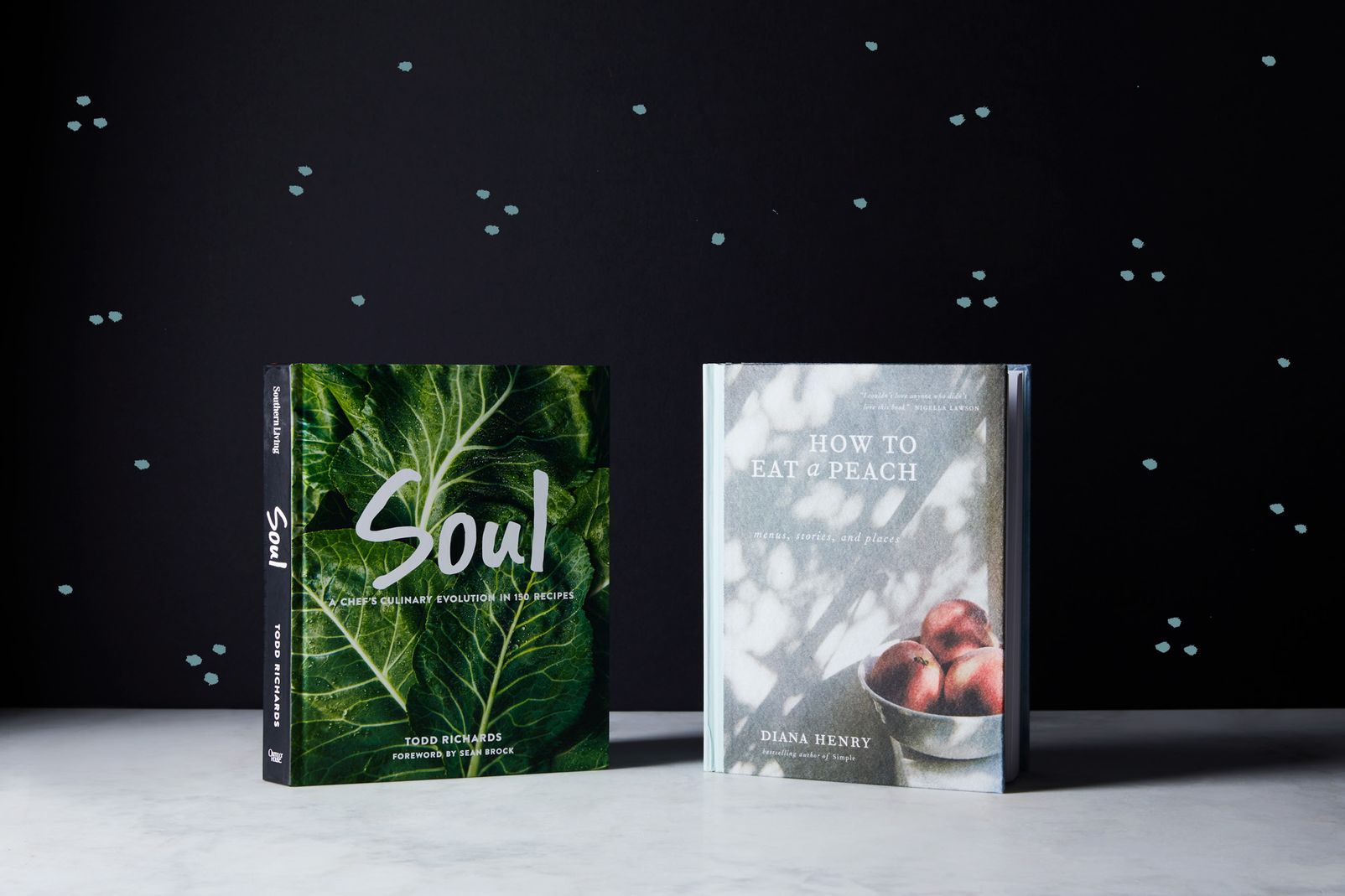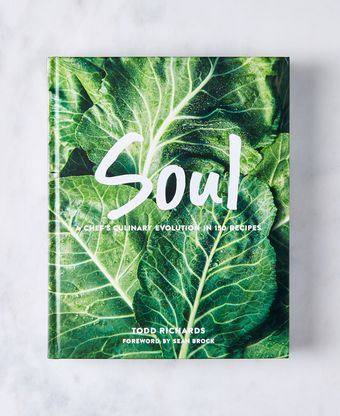Transcript [Editor's Note: This judgment was originally recorded as a video, and intended for that format. The below is an unedited transcript of the video judgment. We recommend that you watch the video to get the full experience of the judgment!]
Hi, guys! So, I've been chosen by the 2019 Piglet Tournament of Cookbooks to judge two cookbooks by two real chefs. The first one is How to Eat a Peach by Diana Henry, and the second is Soul: A Chef's Culinary Evolution in 150 Recipes by Todd Richards. Both books are very strong in certain respects. And it was a little bit about apples and oranges, but what I tried to remind myself is sort of how I approach food and what my point of view is, in terms of how I use it to relate to people. For me, food is a story. Food is how I share my love for people. It's how I say thank you, it's how I say I'm sorry, it's how I say I love you.
I. How to Eat a Peach
I guess, let's get started. It's basically—my understanding of it—a collection of menus which are beautifully crafted. Aesthetically, the book sort of has kind of like this filmy moodiness, kind of like there was this little smoky lens or something that was going on with a lot of the photos. That's very romantic; "aspirational" is a word that I would use to describe it. It just sort of has this, like, really clean, but very elegant upscale quality to it.
The first recipe that I tested out was Leeks with Breton Vinaigrette. I love a recipe that kind of changes the way I look at an ingredient. Usually I tend to cook leeks until they get almost jammy-like, or dark brown. But these are cooked so that there still is a nice firmness to them—you really get to bite into them and taste that delicious fibrous nature. So I like something that lets me kind of, like, visit something in a new way. The ingredients are also all really accessible; these are all things that you can pretty much find in your pantry. It's pretty easy but at the same time very traditionally French. I don't know if I'm just being, like, needy, or if I want to, I don't know... but I wish I knew a little more about the backstory of it—the emotional components of the dish. Because I think every dish should have an emotional component. And I think they do, if you think about it, because you try something and you fall in love with it. I'm like, "Why? Were you with someone special? What was going on in your life then?"
OK. So, the Crêpes Dentelles with Sautéed Apples and Caramel Sauce. The photo in this was just really stunning. And it just reminded me of when my father, who's obsessed with crêpes, would make crêpes when I was a kid. I really liked the way that the recipe was laid out, in terms of explaining how to make crêpes. Steps were all really nice and simple, and for somebody like me, who doesn't make desserts, this is something that anybody can make. And probably my favorite moment of this entire book actually is in the introduction of this: She goes on to explain the dish and then she ends it with "The first pancake is always a dud, so don't worry." Fact! The first two, if you're me. "I was taught to make these by my first French boyfriend. He was called Christophe. I was 15. So for me, this is more than just a recipe." That's it. That, for me, is like gold.
And then the last recipe—oh, yes—the Shaved Fennel, Celery & Apple Salad with Pomegranates & Hazelnuts. What I love about this recipe is... I'm really big on trying to utilize the entire ingredient and not just throwing other parts away. Like, fennel fronds are such a beautiful little thing to add on top of your salad and just make it so chic—and why waste that? And I love a dish where you can really see all the ingredients and right away just kind of get excited to eat it. And that's what this dish sort of did to me.
It's a beautiful book, but I will say—and I'm not sure where this is... again, this is only coming from my opinion—there is something vaguely a little intimidating about it, and I think it could be a little intimidating to somebody who's an amateur or who is not really well-versed in certain things. Intimidating because it's so nice and chic, and I feel like I'm not? I don't know. But anyway.

II. Soul
OK, so, we have Todd Richards' Soul. I kind of really love how he goes directly into his backstory and sort of where he was raised and the different cultural influences that he had growing up. This book has really changed my opinion on Southern cuisine. It's really—like, my understanding of that or the access that I've had to it, or whatever limited knowledge that I have has been exactly that: limited at best. Again I don't want to make assumptions, but I feel like there was a little bit of a lack of understanding or a shame that he had about his own food, about what Southern cuisine was like growing up. But then as he grew up he really got to appreciate it. And what I loved throughout this book is his influences of you know, Jacques Pepin, like traditional French preparation and technique applied to Southern cooking and what he knows. And I just love that sort of melding.
"It starts with honoring our culinary heritage, like Chef Pepin does his, and which took me some time to embrace." That was my understanding about the, like, kind of not really understanding, like, appreciating where you come from and what your roots are, and your history—like, who are you, and who are your people, your tribe, whatever you want to call it. "The next step is to acknowledge one another's. Doing so enriches our lives, our communities, and hopefully opens minds so that we can begin to appreciate what we all bring to the table." Like, that's, like, such a mic drop moment for me.
You know, he writes that "creating and sharing are both spiritual acts." I really believe that. It's a love language. It's an act of service. It's how we get to you know as I mentioned earlier, it's how we get to tell somebody "I really care about you, and I made this from these raw ingredients." Or, "I'm sorry for screwing up or pissing you off"—whatever it is.
I was really affected by this book. I love this dish: Pickled Strawberry Salad with Champagne Vinaigrette, Black Pepper Crème Fraîche, and Smoked Pecans. Incorporating heavy cream with buttermilk and basically making your own crème fraîche had a beautiful [texture]. I always buy this stuff—sorry, not sorry—I don't have time... all the time. But what's nice about this one is that it had, like, the texture of a labneh, but not as tart. It was really lovely. Oh, and the acidity on the pickled strawberries is really delicious.
Next recipe that I did was the Merguez Sausages with Preserved Lemon and Pickled Carrots and Turnips. I'm obsessed with farro. It's one of my favorite grains—it has a really nice nuttiness and it holds really well. And what I love is incorporating cream into this and it's adding another layer of texture. The pickled carrots are really lovely—they bring a nice sweetness to it, and acidity. Tons of different textures going! Great for a party.
This is my favorite favorite recipe of the book—I'm sure there are other really amazing ones—but it's Broiled Lake Perch and Tomato Aspic in Lettuce Wraps. It's basically a fish taco, reinvented—great for a weeknight. I love using coffee in different rubs for meats; I have never thought about using it for fish. And it's brilliant! I don't like to use "flavor bomb," because it's so overused, but that's kind of what it is. The right amount of acidity, you have a bit of a bitterness from the coffee on the fish, and then just, like, the nice, delicate lettuce cup. This is a fantastic dish. Yeah—like, coffee grounds on fish. I feel like that's so badass.
III. The Verdict
It's really—yeah. It's hard and it's uncomfortable as a home cook—let me remind you all—to judge two bodies of work. I know what it's like to write a book (shameless plug: book coming out late this fall). I know what a personal work it can be. Both of these, with Diana and with Todd, like, they put their their hearts and their souls into it. So it's really kind of... it's weird to kind of critique it. But I can only, again, come from my own experience. And my own experience is that when I was writing my book, the recipes I think that came out the best were the ones that had the best personal story, and the reason for making them—the ones that I fought for. That attachment to who you are and where you came from and who you are as a people. And I really got to feel like I got to know Todd a little bit throughout his stories of the book, using traditional dishes and tying it into the life that he's chosen for himself and the training that he's had. And tying in skill into his backstory into where he comes from. And I kind of liked how uncomfortable I was with Todd's book, because there was a lot less that I knew, but yet I wanted to cook from it more as a result of reading it. And it just got me really interested in just exploring that.
I always strive for connection with anybody that I meet. Being on Queer Eye has sort of made that a drug for me. I need to figure out how I can connect with somebody, and I feel like Todd did that more successfully. So, I have to hand it to him, though they're both beautiful books. I really recommend getting them—they're lovely additions to anybody's collection.
So, thanks for listening to my incessant rambling, and the shadow in the background as I recorded this myself. But anyway, gotta make sure I got all my points in here ('cause I gotta be a good student, 'cause I'm Canadian!). That's kind of it. I think Soul should continue to the next round. So, thank you so much for listening to me. This is very long. And, yeah, bye!



27 Comments
"An upset" means "an unexpected result or situation," i.e., "I wanted the other book to win."
That makes more sense, but I still feel like, and it might be just my own interpretation, it's more emotionally charged than the other options.
Also, I agree that the transcript does not read well; to fully enjoy this review and Antoni's warm personality, you really have to watch the video.
This "confessional" style video adds nothing, and we would be better served with a more edited written piece. If you want to push videos, encourage the testers to show some of the dishes they made or techniques that they tried.
While I'm upset my favourite book selected for this years Piglet is already out, I'm looking forward to reading the next verdict on Soul, as unlike all the other reviews this year I've left this not feeling like I know anything about it, and feeling like I've just been told about the press release for How To Eat A Peach, not the actual book (for those of you who own a copy, you really need to try the recipe for Strawberry Buttermilk Ice Cream!)